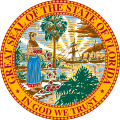References
- 1 2 Shofner, Jerrell H. (1969). "Florida Courts and the Disputed Election of 1876". The Florida Historical Quarterly. 48 (1): 26–46. JSTOR 30145747.
- ↑ "The Great Florida Bubble". The New York Times. 11 June 1878.
- ↑ "State v. McLin | Cases | Westlaw".
- ↑ "Florida Memory - Letter of Resignation from Samuel McInnis to Secretary of State Samuel B. McLin, 1875". Archived from the original on 2019-07-07. Retrieved 2025-07-02.
- ↑ "Florida Memory • Letter from John W. Price to Secretary of State Samuel B. McLin, November 21, 1876". Archived from the original on 2022-12-09. Retrieved 2025-07-02.
- ↑ "Associate Justice", Las Vegas Gazette (March 31, 1877), p. 3.
